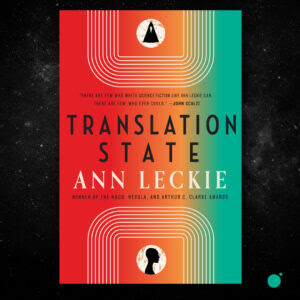Reed's Recommendation Corner: Translation State by Ann Leckie
 |
| Translation State by Ann Leckie. Photo from the Orbit Books website. |
In this novel, we are taken deeper into the politics and worlds that Leckie has presented us with. Even as she uses the universe to describe overarching political mechanics, she also manages to challenge some of her previous assertions.
The story follows three main characters: Enae Athur, a woman who has spent the majority of her life (six decades!) taking care of an aging relative who was incredibly abusive and unable to appreciate Enae's ability to keep her household running. Enae's Grandmamman is old money, and without Enae, would have driven her household staff away (at the least). After she dies, Enae is given the job of tracking down someone who has been missing for so long that the no one really expects her to find them. However, Enae doesn't do anything half-heartedly, and begins to make unexpected progress, which takes her out of her routine and into interesting places.
The second main character is Qven, a Presger translator. Their story is told in first person, and is a very deep look into the aliens that serve as a driving force in the other novels. It's a very in depth look at the life cycle of some of the Presgers - it seems very alien in some ways but in others very familiar. In the beginning, these alien creatures are practically feral - eating, torturing, and hurting each other without any real knowledge of who or what they are. As they move from age group to age group, the expectations for how they should act change drastically. They are taught how to act human, essentially. Presger translators are expected to merge with another, and become essentially subsumed into that older Presger's personality. Qven doesn't want this and will do anything to escape it.
The third main character is Reet Hluid, who was adopted into a large family with two mothers who care for foster children, and is currently working a low level job on a space station in a place called Zeosen. Despite his loving family, he feels he has never really fit in. He has had odd, violent urges his entire life - urges that nearly got him in trouble as a child. As an adult, he is stand-offish and has difficulty relating to others, even his own family. His preferred activity is being alone and watching his favorite adventure show. When he's approached by a diaspora group who claim he's related to a ruling class on their former station, he finally begins to feel like he might find out who he really is. He either misses or ignores the political undertones of the group, and is happy with the new job at they have gotten him.
Reet's new job brings him into contact with Enae, who figures out (quite accidentally), that Reet is the one she has been looking for. This leads to his immediate quarantine and arrest. Enae, who feels awful about destroying his life, rallies his family and the lawyers to help get him out.
Because of this, Reet and Qven come into contact with each other, and are put into a situation where they are told that they have to merge or die.
While this is happening, the treaty that has been negotiated with the Presgers is coming up for renegotiation in order to include other races or species, including some of the original characters from the previous novels.
While this seems to be a sweeping epic, and the decisions reached will have consequences for the entire universe, it is tied up in more personal concerns. There are discussions of complicated feelings towards family, on how we identify ourselves and what those implications are. It's about autonomy and how it clashes with how society thinks we should behave or what we should do with our lives. It isn't about rescuing an entire world or overthrowing a tyrant, but it is about finding ourselves, finding what's right and what we want for ourselves, even if it is simply not what our elders demand.
This novel came at a time when my identity is being heavily challenged by the world around me. While I have a wonderful support network, I identify with Reet's struggle to fit in, to find his place in a world that doesn't entirely make sense to him as he's been told it should be. I love that despite the happy conclusion for everyone, there's still a journey to be had. Enae's story reminded me that it's never to late to make a change, to step outside of your routines and become something more.
Since this novel is a stand-alone, you don't have to read the previous novels in order to understand what is going on, although you'll miss why some of the characters are so important.
Remember to support your local bookstores!



Comments
Post a Comment